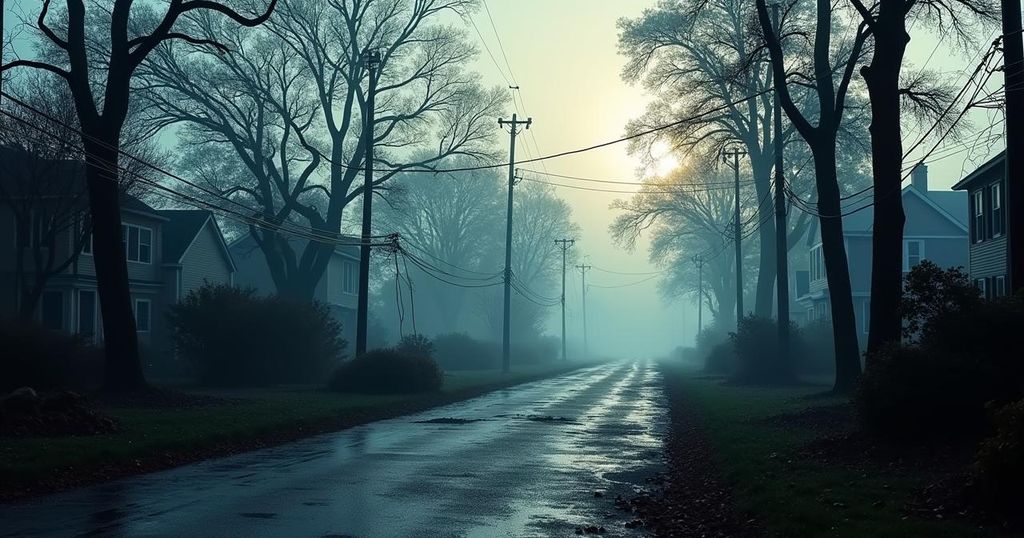Hurricane Helene: One Week After Landfall, Communities Continue to Struggle Without Power and Water
One week after Hurricane Helene’s landfall, approximately one million residents across five Southeastern states remain without power, and the rising death toll has surpassed 184. Local efforts to support residents include meal and water distribution, while recovery efforts are complicated by severe flooding and damage. President Biden has promised federal assistance to the affected states.
A week following the destructive landfall of Hurricane Helene as a Category 4 hurricane along Florida’s Gulf Coast, nearly one million residents across several Southeastern states remain without electricity. The states affected include Florida, Georgia, North Carolina, South Carolina, and Virginia. Numerous residents, particularly in Western North Carolina, continue to face acute shortages of running water. The devastating storm has resulted in a rising death toll, now exceeding 184 fatalities, with ongoing search and rescue operations expected to increase this number further. The breakdown of deaths includes 91 in North Carolina, 36 in South Carolina, 25 in Georgia, 19 in Florida, 11 in Tennessee, and 2 in Virginia, according to analyses by the USA TODAY Network. In Asheville, North Carolina, the situation remains particularly grave, as the region suffered from over a foot of rainfall shortly after Helene was downgraded to a tropical storm. This excessive rainfall has led to extensive damage, affecting hundreds of homes and numerous roads, and leaving many neighborhoods stripped of power and basic utilities. Local efforts are underway to support those affected, with Buncombe County distributing meals and bottled water to residents facing hardship. Amidst these challenges, community members, such as Brandon Mashburn, have taken the initiative to clear debris from parks, emphasizing a spirit of cooperation and resilience: “It’s one of those things that communities came together and said, ‘If nobody’s going to do nothing about it, then we will.'” In other updates regarding the storm’s aftermath, Duke Energy officials indicate that power restoration efforts for certain locales, particularly Pinellas County’s barrier islands, may not be finalized until Sunday. President Joe Biden recently visited areas affected by the hurricane, pledging federal support to states impacted by the disaster. The local narrative of loss is also reflected in personal stories, including that of Lysa Gindinova, who is anxiously awaiting news about her missing relatives after last communicating with them during the initial onslaught of the storm. In the broader context, Hurricane Helene made landfall with maximum sustained winds at approximately 140 mph, leading to catastrophic flooding and mudslides over a vast area already burdened with saturated ground conditions. Though the storm’s winds have receded, the consequences of Helene’s torrential rains are starkly felt across communities devastated by the disaster. Recovery efforts are considerably challenged by the remote Appalachian terrain, complicating immediate assistance for those in need. Additionally, President Biden reaffirmed support for the affected states, stating, “We’re not leaving until you’re back on your feet completely.” The ongoing recovery from Hurricane Helene highlights the resilience of affected communities while revealing the extensive support required to recover from such unprecedented natural disasters.
Hurricane Helene struck the southeastern United States roughly a week ago, making landfall at Category 4 strength on the Gulf Coast of Florida. The states in the path of Helene experienced catastrophic ramifications, including widespread power outages, severe flooding, and numerous fatalities resulting from the storm’s impact. In particular, communities in North Carolina’s Blue Ridge Mountains and surrounding areas have faced significant challenges, complicating recovery efforts and highlighting resource shortages.
In summary, Hurricane Helene’s aftermath continues to affect nearly one million residents across the Southeast, particularly in North Carolina, as communities contend with significant power and water shortages. The once vibrant neighborhoods are now grappling with the long-term impacts of the storm, reflected in both personal loss and infrastructural devastation. Key figures, such as President Biden, have shown their commitment to assist in recovery, yet the path ahead for affected communities remains arduous and necessitates continued support and resilience.
Original Source: www.usatoday.com




Post Comment